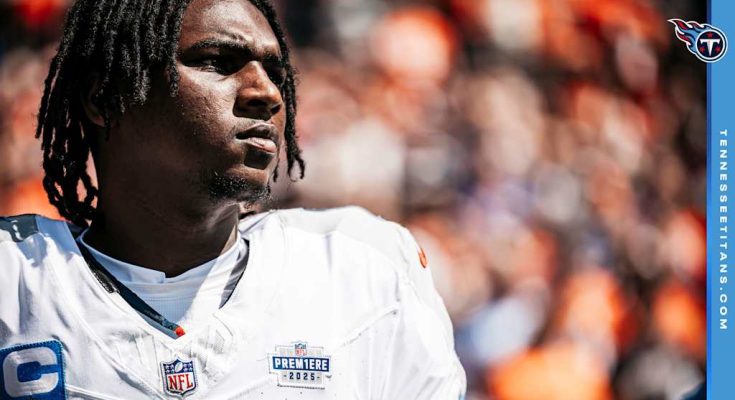Tennessee Titans quarterback Cam Ward has made it clear that he will never publicly criticize a receiver for dropping a pass, no matter how costly the play might be in a given moment. His reasoning is straightforward yet profound: football is a game of mistakes as much as it is of highlights, and just as a wideout might drop a crucial ball, a quarterback is bound to throw an interception at some point during the season. Ward’s comments speak to his leadership style, his understanding of accountability, and the kind of culture he is trying to establish in Tennessee as he embarks on his NFL career.
The NFL is a league built on razor-thin margins, where a single mistake can swing the outcome of a game. A dropped pass on third down or a poorly thrown ball that ends up in the hands of the defense can be the difference between a win and a loss. For that reason, tensions often run high on the sideline, and it isn’t uncommon to see quarterbacks showing frustration when a receiver fails to complete a play. Some of the league’s most competitive passers, from Tom Brady to Aaron Rodgers, have had moments of visible displeasure toward their teammates when execution fell short. But Ward’s stance suggests that he is choosing a different path — one rooted in patience, understanding, and team unity.
Ward, who has quickly earned a reputation as a confident but composed young quarterback, recognizes that calling out teammates can be destructive rather than constructive. He understands that no receiver intends to drop a pass, just as no quarterback aims to throw an interception. Mistakes are part of the game. By making it clear that he will not berate his pass-catchers, Ward is signaling that his focus is on moving forward rather than dwelling on errors. In a league where quarterbacks are expected to lead not just with their arms but with their voices and attitudes, this kind of approach can set the tone for an entire locker room.
What stands out in Ward’s words is his self-awareness. By saying he’ll throw a pick at some point in the season, he’s acknowledging his own fallibility. For a young quarterback, this humility is refreshing. Many rookies and sophomores entering the league feel an intense need to prove themselves, sometimes at the expense of being overly harsh on others. Ward’s perspective demonstrates that he already understands the importance of accountability. When players see their quarterback admit that he is not immune to mistakes, it fosters respect. It creates a culture where players are more willing to own up to their shortcomings, knowing that their leader is doing the same.
For the Titans, Ward’s leadership is especially valuable. The team is in a period of transition, trying to establish a new identity and build consistency after years of ups and downs. Ward stepping into the role of quarterback means he is not just a passer but the face of the franchise moving forward. His philosophy about dealing with mistakes could help unify the offense and keep morale steady during tough stretches. Wide receivers, running backs, and tight ends play freer when they know their quarterback won’t throw them under the bus for an error. In turn, that freedom can lead to more confidence, more aggressive play, and ultimately better results.
Of course, Ward’s comments also reflect an understanding of the mental side of football. Drops don’t just affect the scoreboard; they affect confidence. A receiver who feels singled out might play hesitantly, second-guessing their hands the next time the ball comes their way. By choosing not to scold his pass-catchers, Ward is making sure that they stay mentally sharp and focused on the next play rather than dwelling on the last one. His approach is about resilience — teaching his teammates to quickly shake off a mistake and prepare for the next opportunity.
It’s worth noting that many of the game’s great quarterbacks have echoed similar sentiments, even if they sometimes showed visible frustration in the moment. Peyton Manning, for example, was known for his fiery sideline presence but always emphasized accountability beginning with himself in postgame pressers. Drew Brees, another respected leader, often said that communication and trust with receivers was more important than perfection. Ward’s early declaration that he will not get on a receiver for a drop puts him in the lineage of quarterbacks who understand that leadership requires more than simply executing plays. It requires building relationships and instilling belief.
Ward’s words also raise interesting points about the evolving culture of leadership in the NFL. In past eras, harsh, vocal leadership was more common — quarterbacks and coaches barking at teammates was not only accepted but often celebrated as “tough love.” Today, there is a growing emphasis on emotional intelligence and maintaining a supportive environment. Younger players, particularly in the era of social media scrutiny and instant replay, respond better to encouragement than public criticism. Ward seems to embody this modern leadership style, balancing competitiveness with compassion.
For Titans fans, Ward’s comments are reassuring. They suggest that their new quarterback is not only focused on his physical performance but also on how he can elevate the entire team. He is showing that he understands the big picture: winning is not just about avoiding mistakes but about how a team responds when mistakes inevitably occur. If Ward is patient with his receivers, they will likely be patient with him when he makes an error. That kind of mutual trust can turn a collection of players into a cohesive unit.
The quarterback-receiver dynamic has always been one of the most scrutinized relationships in football. A successful connection requires trust, timing, and chemistry. Drops and interceptions are inevitable, but how the two parties handle them can determine whether the relationship strengthens or fractures. By vowing not to criticize his receivers for mistakes, Ward is essentially investing in the long-term health of those relationships. He is making it clear that he values trust over short-term frustration, and that mindset could pay dividends when the Titans face adversity in high-pressure situations.
Ward’s attitude also demonstrates maturity beyond his years. Young quarterbacks often feel pressure to assert themselves and prove their leadership through visible displays of authority. Ward, however, seems to understand that true authority comes from consistency and empathy. Teammates are more likely to rally around a quarterback who lifts them up than one who tears them down. If Ward continues to live out this philosophy, he could become the kind of leader who not only commands respect but also inspires loyalty.
It’s also important to think about how this philosophy might influence the broader culture of the Titans locker room. If Ward sets the standard by taking accountability and showing grace toward mistakes, it could encourage other players to do the same. Instead of finger-pointing after losses, the team might adopt a collective mindset of owning mistakes and working to improve together. That kind of culture doesn’t just make for a more harmonious locker room; it also translates into better on-field resilience. Teams that trust one another are more likely to bounce back from deficits and perform under pressure.
Ward’s perspective will be tested throughout the season. Drops will happen in critical moments. Interceptions will come, sometimes in heartbreaking fashion. How he responds in those moments will show whether his words are more than just talk. But if his early comments are any indication, Ward intends to stay true to his philosophy. That steadiness could become a defining trait of his career.
The Titans, who have been searching for stability at quarterback, may have found more than just a passer in Cam Ward. They may have found a leader who understands the human side of the game. Football is about execution, but it’s also about trust, resilience, and unity. By refusing to get on his receivers for drops and openly acknowledging his own mistakes, Ward is laying the foundation for a culture where players lift each other up instead of tearing each other down.
In a league where every team is searching for the next great leader under center, Ward is showing that leadership doesn’t always come from being the loudest voice or the most critical. Sometimes it comes from being the steady hand, the calming presence, and the one who reminds his teammates that mistakes are part of the journey. The Titans may not win every game, and Ward will undoubtedly face challenges as he grows into the role of franchise quarterback, but with his mindset, he is giving Tennessee the best chance to grow into a team that plays not only with talent but with trust.
Cam Ward’s declaration is more than just a soundbite — it’s a glimpse into the kind of quarterback and leader he aspires to be. He knows the ball will hit the turf sometimes. He knows defenders will snatch an interception now and then. What matters is how the team responds, and by choosing patience and accountability, Ward is proving that he is not just playing quarterback for the Titans — he is embodying what it means to be their leader.



